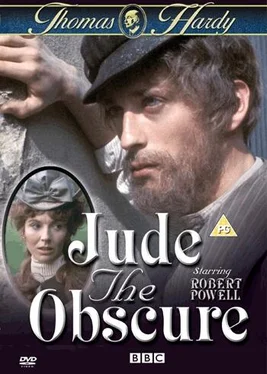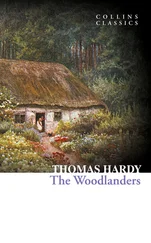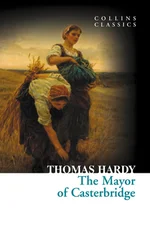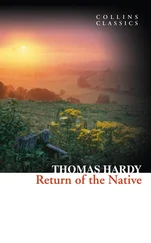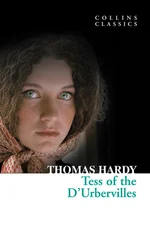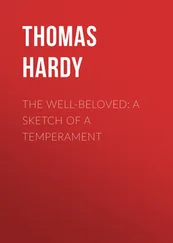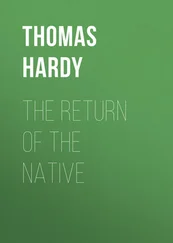"That you'll never be told," said she deedily.
"Whoever did it was wasteful of other people's property."
"Oh, that's nothing."
"But you want to speak to me, I suppose?"
"Oh yes; if you like to."
"Shall I clamber across, or will you come to the plank above here?"
Perhaps she foresaw an opportunity; for somehow or other the eyes of the brown girl rested in his own when he had said the words, and there was a momentary flash of intelligence, a dumb announcement of affinity in posse between herself and him, which, so far as Jude Fawley was concerned, had no sort of premeditation in it. She saw that he had singled her out from the three, as a woman is singled out in such cases, for no reasoned purpose of further acquaintance, but in commonplace obedience to conjunctive orders from headquarters, unconsciously received by unfortunate men when the last intention of their lives is to be occupied with the feminine.
Springing to her feet, she said: "Bring back what is lying there."
Jude was now aware that no message on any matter connected with her father's business had prompted her signal to him. He set down his basket of tools, picked up the scrap of offal, beat a pathway for himself with his stick, and got over the hedge. They walked in parallel lines, one on each bank of the stream, towards the small plank bridge. As the girl drew nearer to it, she gave without Jude perceiving it, an adroit little suck to the interior of each of her cheeks in succession, by which curious and original manœuvre she brought as by magic upon its smooth and rotund surface a perfect dimple, which she was able to retain there as long as she continued to smile. This production of dimples at will was a not unknown operation, which many attempted, but only a few succeeded in accomplishing.
They met in the middle of the plank, and Jude, tossing back her missile, seemed to expect her to explain why she had audaciously stopped him by this novel artillery instead of by hailing him.
But she, slyly looking in another direction, swayed herself backwards and forwards on her hand as it clutched the rail of the bridge; till, moved by amatory curiosity, she turned her eyes critically upon him.
"You don't think I would shy things at you?"
"Oh no."
"We are doing this for my father, who naturally doesn't want anything thrown away. He makes that into dubbin." She nodded towards the fragment on the grass.
"What made either of the others throw it, I wonder?" Jude asked, politely accepting her assertion, though he had very large doubts as to its truth.
"Impudence. Don't tell folk it was I, mind!"
"How can I? I don't know your name."
"Ah, no. Shall I tell it to you?"
"Do!"
"Arabella Donn. I'm living here."
"I must have known it if I had often come this way. But I mostly go straight along the high-road."
"My father is a pig-breeder, and these girls are helping me wash the innerds for black-puddings and such like."
They talked a little more and a little more, as they stood regarding each other and leaning against the hand-rail of the bridge. The unvoiced call of woman to man, which was uttered very distinctly by Arabella's personality, held Jude to the spot against his intention—almost against his will, and in a way new to his experience. It is scarcely an exaggeration to say that till this moment Jude had never looked at a woman to consider her as such, but had vaguely regarded the sex as beings outside his life and purposes. He gazed from her eyes to her mouth, thence to her bosom, and to her full round naked arms, wet, mottled with the chill of the water, and firm as marble.
"What a nice-looking girl you are!" he murmured, though the words had not been necessary to express his sense of her magnetism.
"Ah, you should see me Sundays!" she said piquantly.
"I don't suppose I could?" he answered
"That's for you to think on. There's nobody after me just now, though there med be in a week or two." She had spoken this without a smile, and the dimples disappeared.
Jude felt himself drifting strangely, but could not help it. "Will you let me?"
"I don't mind."
By this time she had managed to get back one dimple by turning her face aside for a moment and repeating the odd little sucking operation before mentioned, Jude being still unconscious of more than a general impression of her appearance. "Next Sunday?" he hazarded. "To-morrow, that is?"
"Yes."
"Shall I call?"
"Yes."
She brightened with a little glow of triumph, swept him almost tenderly with her eyes in turning, and retracing her steps down the brookside grass rejoined her companions.
Jude Fawley shouldered his tool-basket and resumed his lonely way, filled with an ardour at which he mentally stood at gaze. He had just inhaled a single breath from a new atmosphere, which had evidently been hanging round him everywhere he went, for he knew not how long, but had somehow been divided from his actual breathing as by a sheet of glass. The intentions as to reading, working, and learning, which he had so precisely formulated only a few minutes earlier, were suffering a curious collapse into a corner, he knew not how.
"Well, it's only a bit of fun," he said to himself, faintly conscious that to common sense there was something lacking, and still more obviously something redundant in the nature of this girl who had drawn him to her which made it necessary that he should assert mere sportiveness on his part as his reason in seeking her—something in her quite antipathetic to that side of him which had been occupied with literary study and the magnificent Christminster dream. It had been no vestal who chose that missile for opening her attack on him. He saw this with his intellectual eye, just for a short; fleeting while, as by the light of a falling lamp one might momentarily see an inscription on a wall before being enshrouded in darkness. And then this passing discriminative power was withdrawn, and Jude was lost to all conditions of things in the advent of a fresh and wild pleasure, that of having found a new channel for emotional interest hitherto unsuspected, though it had lain close beside him. He was to meet this enkindling one of the other sex on the following Sunday.
Meanwhile the girl had joined her companions, and she silently resumed her flicking and sousing of the chitterlings in the pellucid stream.
"Catched un, my dear?" laconically asked the girl called Anny.
"I don't know. I wish I had thrown something else than that!" regretfully murmured Arabella.
"Lord! he's nobody, though you med think so. He used to drive old Drusilla Fawley's bread-cart out at Marygreen, till he 'prenticed himself at Alfredston. Since then he's been very stuck up, and always reading. He wants to be a scholar, they say."
"Oh, I don't care what he is, or anything about 'n. Don't you think it, my child!"
"Oh, don't ye! You needn't try to deceive us! What did you stay talking to him for, if you didn't want un? Whether you do or whether you don't, he's as simple as a child. I could see it as you courted on the bridge, when he looked at 'ee as if he had never seen a woman before in his born days. Well, he's to be had by any woman who can get him to care for her a bit, if she likes to set herself to catch him the right way."
The next day Jude Fawley was pausing in his bedroom with the sloping ceiling, looking at the books on the table, and then at the black mark on the plaster above them, made by the smoke of his lamp in past months.
It was Sunday afternoon, four-and-twenty hours after his meeting with Arabella Donn. During the whole bygone week he had been resolving to set this afternoon apart for a special purpose,—the re-reading of his Greek Testament—his new one, with better type than his old copy, following Griesbach's text as amended by numerous correctors, and with variorum readings in the margin. He was proud of the book, having obtained it by boldly writing to its London publisher, a thing he had never done before.
Читать дальше
